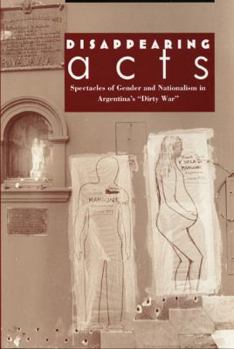Disappearing Acts: Spectacles of Gender and Nationalism in Argentina's Dirty War
In Disappearing Acts , Diana Taylor looks at how national identity is shaped, gendered, and contested through spectacle and spectatorship. The specific identity in question is that of Argentina, and Taylor's focus is directed toward the years 1976 to 1983 in which the Argentine armed forces were pitted against the Argentine people in that nation's "Dirty War." Combining feminism, cultural studies, and performance theory, Taylor analyzes the political spectacles that comprised the war--concentration camps, torture, "disappearances"--as well as the rise of theatrical productions, demonstrations, and other performative practices that attempted to resist and subvert the Argentine military. Taylor uses performance theory to explore how public spectacle both builds and dismantles a sense of national and gender identity. Here, nation is understood as a product of communal "imaginings" that are rehearsed, written, and staged--and spectacle is the desiring machine at work in those imaginings. Taylor argues that the founding scenario of Argentineness stages the struggle for national identity as a battle between men--fought on, over, and through the feminine body of the Motherland. She shows how the military's representations of itself as the model of national authenticity established the parameters of the conflict in the 70s and 80s, feminized the enemy, and positioned the public--limiting its ability to respond. Those who challenged the dictatorship, from the Mothers of the Plaza de Mayo to progressive theater practitioners, found themselves in what Taylor describes as "bad scripts." Describing the images, myths, performances, and explanatory narratives that have informed Argentina's national drama, Disappearing Acts offers a telling analysis of the aesthetics of violence and the disappearance of civil society during Argentina's spectacle of terror.
Format:Paperback
Language:English
ISBN:0822318687
ISBN13:9780822318682
Release Date:February 1997
Publisher:Duke University Press
Length:328 Pages
Weight:1.30 lbs.
Dimensions:1.0" x 6.0" x 9.2"
Customer Reviews
2 ratings
Not a First Resource Seeking Information on The Dirty War
Published by Thriftbooks.com User , 19 years ago
Diana Taylor is a brilliant writer and an obviously informed expert on the Dirty War of Argentina (1963 - 1976), a writer who has composed a Doctoral Thesis approach to her well-informed information about this misunderstood atrocity that nearly destroyed Argentina. Yet sound as her thoughts are and intensely well documented though her theories prove to be, this book is not recommended as the first line of information about this subject. Taylor's premise involves theories as to how the Dirty War, or the atmosphere under the military juntas that replaced Peronism, are based on her observations as to how the public remained fearfully silent during this time of concentration camps, torture, atrocities, and most importantly the 'desaparecidos' (or disappearing ones) whose only voices were in the quiet marches of the Madres de la Plaza de Mayo. She informs us that the use of plays and spectacles attended by the Argentinians were in their own way a show of defiance to the manipulative military juntas. Performance, theatre, and poetry were the elected means of tacitly protesting the totalitarian military rule that choked this country until the fall of the juntas in the war over the Malvinas/Falkland Islands with Great Britain. While all of what Taylor has to say is interesting and novel and important, what is needed to gain the most from this heady book is more time spent educating the reader about the political and social history of Argentina. Though the "Dirty War' is at times referenced in conversations about South American politics, sadly most of what we as the general public know of what lead up to the military takeover of the government is what we glean from such feeble resources as the musical EVITA! Though Taylor attempts to reference the state of Peronism in contrasting the fall of Juan and Evita (and subsequently Isabelita) Peron as a period of hallowing the feminine influence of the 'weak' but loved leaders, she jumps too quickly into the theory of the military overthrow as a reaction to the feminine, the desecration of the female standard so toppled by the military in its abusive treatment of women and children. Where Taylor particularly shines (and there is MUCH to appreciate in this turgid, difficult to read book) is in her extended discussion of the Madres de la Plaza de Mayo. Here her theories all seem to gel. What is copiously discussed in the plays, poetry, and public spectacles (and Taylor is an experienced performance artist herself) is very important information, but draws excessive focus to the sedentary response to the Dirty War. This book is doubtless an important document about a too little understood period of Argentinean history and Taylor is careful to point out similarities of public response in the US and in other countries whose governments seem less and less For and Of and By the people. I would recommend starting with more basic book about this period in time to reap the rewards that Diana Taylor has to offer i
Wonderful, fresh look at Argentina's Dirty War
Published by Thriftbooks.com User , 26 years ago
Taylor has created beautiful book out of a horrendous period in Argentina. She is a wonderful writer, and the book left me with a prfound sense of sadness and a desire to save the world. I am currently studying the Dirty War and I found this book has been the meat of my studies. She looks at the Dirty War at many different angles and ties them together masterfully. From its theatricality, its war against women, and what we, as Americans, must do as spectators to this Dirty War, Taylor urges that the spectators have the greatest role of all. Even twenty years after the war has ended, Taylor has created a book that forces Americans to evaluate our situation as spectators and contributors to the darkest period of Argentina's recent history. A must read...the book is easy to understand even if you know next to nothing about Argentina.






